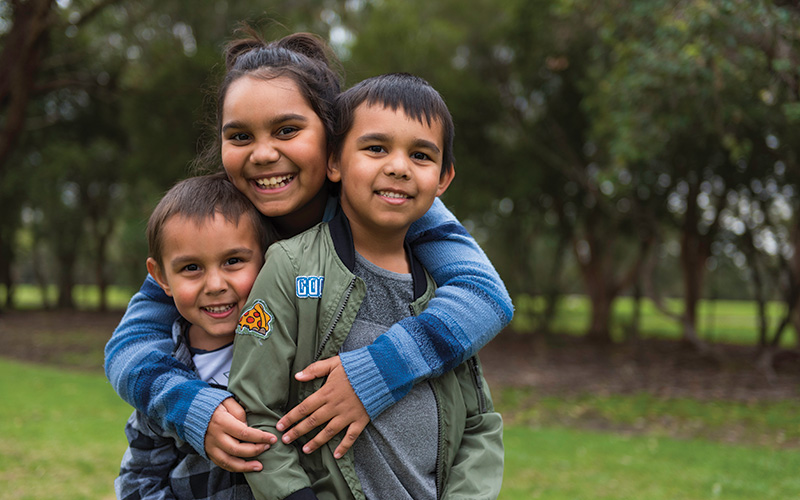Search
Research
Ways of working in Aboriginal and Torres Strait Islander Community Controlled Health Organisations: describing a conceptual model of comprehensive primary healthcare characteristicsThis research sought to describe a conceptual model of Aboriginal and Torres Strait Islander Community Controlled Health Organisation (ATSICCHO) primary health care, and the fundamental role ATSICCHOs exercise in addressing critical service gaps needed to achieve equitable outcomes for Aboriginal and Torres Strait Islander peoples.

The Institute's Standards for the Conduct of Aboriginal Health Research outline our ways of working with Aboriginal communities and peoples.
Research
Centralising Local Aboriginal Language and Culture in Healthy Skin Books on the See Treat Prevent (SToP) Trial in the Kimberley Region of Western Australia: A Process and Impact InquiryLanguage is significant for communicating knowledge across cultures and generations and has the power to attribute meanings and alter our worldviews.
Research
Exploring the evidence on housing and health among Indigenous peoples in high-income countries: A scoping review protocolThe objective of this scoping review is to understand the nature of the published evidence on housing suitability, affordability, insecurity, and homelessness in relation to physical and mental health, domestic violence, and health service use among Indigenous people in high-income countries.
Research
The impact of genetics and the environment on cancer risk in Indigenous Australians: a narrative reviewAboriginal and Torres Strait Islander (hereafter respectfully named Indigenous) Australians are diagnosed with some cancers substantially more frequently than non-Indigenous Australians implying a different risk factor landscape. Additionally, poorer outcomes for certain cancers are exacerbated by lower cancer screening rates and later diagnoses compared to non-Indigenous Australians.
Research
The Heart Health Yarning Tool: Co-Designing a Shared Decision-Making Tool With Aboriginal and Torres Strait Islander People for Cardiovascular Disease Prevention and Risk ManagementDue to the ongoing impact of colonisation, Aboriginal and Torres Strait Islander people live with a greater burden of cardiovascular disease (CVD) than non-Indigenous Australians. Shared decision-making (SDM) is recognised as an essential component of person-centred care. However, there has been a lack of tools to support clinician communication and SDM to address CVD prevention in this important 'at-risk' population.
Research
“You’re telling us to go first?!” COVID-19 pandemic and vaccination experiences among Aboriginal adults in Western AustraliaGlobally, Indigenous populations have been disproportionately impacted by pandemics. In Australia, though national infection rates with COVID-19 infections in Aboriginal and/or Torres Strait Islander people were lower in the first 12 months of the COVID-19 pandemic, there was soon a greater burden in Aboriginal and/or Torres Strait Island people once Omicron was circulating. Uptake of the COVID-19 vaccine was also lower among Aboriginal and/or Torres Strait Islander people.
Research
Genomic characterization of clinically significant blood group variants in Aboriginal AustraliansHematological disorders are often treated with blood transfusions. Many blood group antigens and variants are population-specific, and for patients with rare blood types, extensive donor screening is required to find suitable matches for transfusion. There is a scarcity of knowledge regarding blood group variants in Aboriginal Australian populations, despite a higher need for transfusion due to the higher prevalence of renal diseases and anemia.
Research
Healthy skin for children and young people with skin of colour starts with clinician knowledge and recognition: a narrative reviewSkin conditions most frequently encountered in paediatric practice include infections, infestations, atopic dermatitis, and acne. Skin of colour refers to skin with increased melanin and darker pigmentation, and reflects global racial and ethnic diversity. Managing skin conditions in skin of colour requires health equity nuance, which is rarely explicitly taught.
Research
The Future Healthy Countdown 2030 consensus statement: core policy actions and measures to achieve improvements in the health and wellbeing of children, young people and future generationsThis consensus statement recommends eight high-level trackable policy actions most likely to significantly improve health and wellbeing for children and young people by 2030. These policy actions include an overarching policy action and span seven interconnected domains that need to be adequately resourced for every young person to thrive: Material basics; Valued, loved and safe; Positive sense of identity and culture; Learning and employment pathways; Healthy; Participating; and Environments and sustainable futures.
